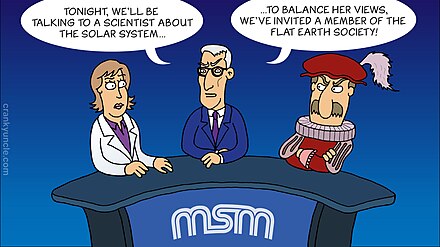虚假平衡
虚假平衡[1](英语:false balance),或称两面主义(bothsidesism),是一种新闻工作者的媒体偏见;它指在证据所能支持的范围外,平衡地展现两种对立观点。新闻工作者可能会在报道中为一个问题的争论双方列出与实际比例不符的证据,或者可能遗漏一方的信息造成该方的主张无根据。虚假平衡被学者认为是传播错误资讯的因素之一[2]。

虚假平衡有时会源于类似轰动效应的动机,作者和编辑可能会觉得一篇被描绘成有争议的报道会比更准确地描述这个问题的报道更有商业价值。与许多其他媒体偏见不同,虚假平衡也可能起源于试图避免偏见;作者和编辑可能会对某一问题感到困惑,并将两种互相竞争的观点“平等”地比较。例如,即便在有一方观点是基于错误的前提下,媒体仍然因其具实际价值和显著性,从而比例平等地对待双方的观点,给予双方相同的篇幅[3]。
科学新闻中有关虚假平衡的例子包括全球变暖与自然气候变迁的比较、吸烟对健康的影响、硫柳汞疫苗与自闭症的关系[4]、演化与智能设计等[5]。
例子
编辑亚美尼亚种族灭绝
编辑特伦斯·德斯·普雷斯于1986年报道称“有关亚美尼亚种族灭绝的事实直到最近仍被认为不存在争议”。但在最近,一方面由于土耳其的地缘政治地位,另一方面由于人们越来越倾向于把每一个问题的正反双方当作同样合理来处理,亚美尼亚种族灭绝相关的事实变得越来越模糊[6]。
全球变暖
编辑全球变暖问题上的辩论往往是虚假平衡的体现。尽管科学界几乎一致认为1950年以后的全球变暖是由第一次工业革命所导致[7][8][9][10],仍有极少数的科学家质疑这一结论[11][12][13]。给予双方平等的声音会让人觉得科学界内针对全球变暖这一问题存在严重的分歧,然而事实上主流科学共识认为人为的全球变暖始终存在。
麻腮风三联疫苗争议
编辑众多观察家批评大众媒体不应卷入这一争议,并称状况犹如“新闻发布会科学”[14],并认为媒体为安德鲁·韦克菲尔德提供了其不应有的可靠性。一篇由肖纳·希尔顿(Shona Hilton)、马克·佩蒂克鲁(Mark Petticrew)及凯特·亨特(Kate Hunt)发表于《生物医学中心公共健康》2007年3月的研究显示媒体对安德鲁·韦克菲尔德的报道“造成了人们对疫苗导致自闭症的印象增强,尽管有大量证据反对这一观点”(created the misleading impression that the evidence for the link with autism was as substantial as the evidence against)[15]。此前,发表在《英国医学期刊》及《医学通讯》的一系列论文得出“媒体的报道在韦克菲尔德的假说上误导了大众”的结论[16][17][18]。
另见
编辑参考文献
编辑- ^ 严俊. 从“气候门”事件看美国媒体的虚假平衡报道. 《新闻记者》. 2010, 7: 64–68 [2021-03-09].
- ^ Boykoff, Maxwell T; Boykoff, Jules M. Balance as bias: global warming and the US prestige press. Global Environmental Change. 2004, 14 (2): 125–136. doi:10.1016/j.gloenvcha.2003.10.001.
- ^ Krugman, Paul. A False Balance. The New York Times. 2006-01-30 [2021-03-09]. (原始内容存档于2017-10-19).
- ^ Gross L. A broken trust: lessons from the vaccine—autism wars. PLoS Biol. 2009, 7 (5): 756–9. PMC 2682483 . PMID 19478850. doi:10.1371/journal.pbio.1000114.
- ^ Scott, Eugenie C. Evolution vs. Creationism: An Introduction (PDF) Second. Westport, CT: Greenwood Press. 2009 [2017-11-01]. ISBN 9780313344275. (原始内容存档 (PDF)于2013-11-02).
- ^ Des Pres, Terrence. On Governing Narratives: The Turkish-Armenian Case. The Yale Review. 1986a, LXXV (4): 517–531. ISSN 0044-0124.
- ^ Edenhofer, Ottmar; Pichs-Madruga, Ramón; Sokona, Youba; et al (编). Climate Change 2014: Mitigation of Climate Change: Working Group III contribution to the Fifth Assessment Report of the Intergovernmental Panel on Climate Change. Cambridge, UK; New York: Cambridge University Press. 2014 [2021-03-09]. ISBN 9781107058217. OCLC 892580682. doi:10.1017/CBO9781107415416. (原始内容存档于2020-08-01).
- ^ America's Climate Choices: Panel on Advancing the Science of Climate Change; National Research Council. Advancing the Science of Climate Change. Washington, D.C.: National Academies Press. 2010 [2021-03-09]. ISBN 978-0-309-14588-6. (原始内容存档于2014-05-29).
- ^ Unger, Nadine; Bond, Tami C.; Wang, James S.; Koch, Dorothy M.; Menon, Surabi; Shindell, Drew T.; Bauer, Susanne. Attribution of climate forcing to economic sectors. Proceedings of the National Academy of Sciences of the United States of America. 2010-02-23, 107 (8): 3382–7. Bibcode:2010PNAS..107.3382U. PMC 2816198 . PMID 20133724. doi:10.1073/pnas.0906548107.
- ^ Committee on Surface Temperature Reconstructions for the Last 2,000 Years, National Research Council. Surface Temperature Reconstructions for the Last 2,000 Years. Washington, D.C.: The National Academies Press. 2006 [2021-03-09]. ISBN 0-309-10225-1. (原始内容存档于2007-04-28).
- ^ Anderegg, William R. L.; Prall, James W.; Harold, Jacob; Schneider, Stephen H. Expert credibility in climate change. Proceedings of the National Academy of Sciences. 2010-07-06, 107 (27): 12107–9. Bibcode:2010PNAS..10712107A. PMC 2901439 . PMID 20566872. doi:10.1073/pnas.1003187107.
- ^ Oreskes, Naomi. The Scientific Consensus on Climate Change. Science. 2004-12-03, 306 (5702): 1686. PMID 15576594. doi:10.1126/science.1103618.
- ^ Doran, Peter T.; Zimmerman, Maggie Kendall. Examining the Scientific Consensus on Climate Change (PDF). Eos. 2009-01-20, 90 (3): 22–23 [2021-03-09]. Bibcode:2009EOSTr..90...22D. doi:10.1029/2009EO030002. (原始内容存档 (PDF)于2019-09-25).
- ^ Moore Andrew. Bad science in the headlines: Who takes responsibility when science is distorted in the mass media?. EMBO Reports. 2006, 7 (12): 1193–1196 [2021-03-09]. PMC 1794697 . PMID 17139292. doi:10.1038/sj.embor.7400862. (原始内容存档于2020-07-03).
- ^ Hilton S, Petticrew M, Hunt K. Parents' champions vs. vested interests: Who do parents believe about MMR? A qualitative study. BMC Public Health. 2007, 7: 42. PMC 1851707 . PMID 17391507. doi:10.1186/1471-2458-7-42.
- ^ Speers T, Justin L. Journalists and jabs: media coverage of the MMR vaccine. Communication and Medicine. 2004-09, 1 (2): 171–181. PMID 16808699. doi:10.1515/come.2004.1.2.171.
- ^ Jackson T. MMR: more scrutiny, please. The BMJ. 2003, 326 (7401): 1272. PMC 1126154 . doi:10.1136/bmj.326.7401.1272.
- ^ Dobson Roger. Media misled the public over the MMR vaccine, study says. The BMJ. 2003-05, 326 (7399): 1107. PMC 1150987 . PMID 12763972. doi:10.1136/bmj.326.7399.1107-a.